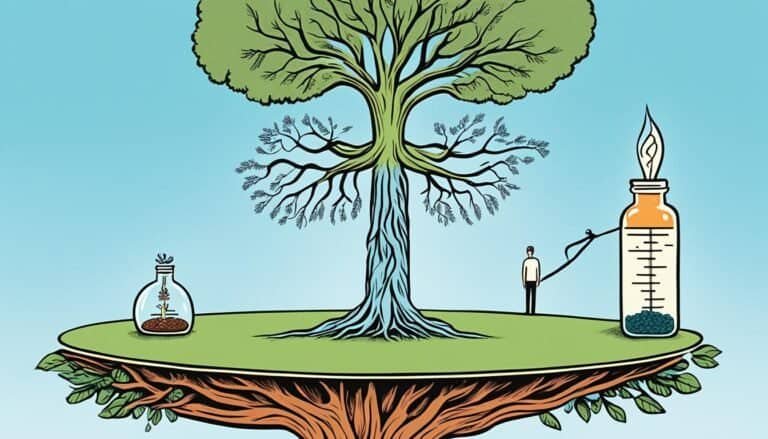Self-Care Practices for Optimal Mental Health
Feeling overwhelmed by the demands of daily life? In a world that constantly bombards you with information and obligations, it's easy to neglect your mental well-being. But what if there were simple, effective ways to prioritize your mental health amidst the chaos?
You might be surprised to learn that incorporating certain self-care practices into your routine can significantly impact your overall mental well-being. With a few intentional adjustments, you can take control of your mental health and find a sense of balance and calm that you've been craving.
Key Takeaways
- Mind-body practices such as mindfulness meditation and regular exercise are essential for promoting mental well-being, reducing stress, and building resilience.
- Quality sleep and healthy nutrition play a crucial role in maintaining optimal mental health by supporting cognitive function, regulating mood, and providing restorative rest.
- Engaging in creative expression through art therapy, journaling, music therapy, or dance therapy can be a powerful tool for processing emotions, enhancing self-expression, and reducing stress.
- Setting boundaries, both in terms of personal space and time management, is crucial for self-care and protecting emotional well-being. It helps maintain respect, prevents burnout, and establishes a healthy work-life balance.
Mindfulness Meditation
Engaging in mindfulness meditation can help you cultivate present moment awareness and promote mental well-being. By incorporating mindfulness techniques into your daily routine, you can experience stress relief and gain a deeper understanding of your thoughts and emotions. This practice allows you to observe your feelings without judgment, leading to a greater sense of clarity and inner peace.
The benefits of meditation are numerous, with mental clarity being one of the most significant. As you engage in mindfulness meditation, you'll find that your mind becomes less cluttered, and you can focus more clearly on the present moment. This increased mental clarity can have a profound impact on your overall well-being, helping you navigate life's challenges with a greater sense of calm and resilience.
Incorporating mindfulness meditation into your self-care routine can provide a powerful tool for managing stress and promoting emotional balance. As you continue to practice, you may find that you're better equipped to handle the demands of daily life, leading to a more centered and contented state of being.
Regular Exercise
As you explore self-care practices for mental health, incorporating regular exercise into your routine can further enhance your overall well-being and support your journey towards a balanced and resilient state of mind. Engaging in high-intensity workouts, such as interval training or cardio exercises, can be particularly beneficial for your mental health. High-intensity exercise has been shown to release endorphins, which are natural mood lifters, and reduce levels of stress hormones in the body.
In addition to high-intensity workouts, establishing a consistent exercise routine is crucial for reaping the mental health benefits of physical activity. By scheduling regular exercise sessions, you create a sense of structure and predictability in your day-to-day life, which can help alleviate symptoms of anxiety and depression. Moreover, sticking to a consistent exercise routine can boost your self-esteem and confidence as you witness improvements in your physical strength and endurance over time.
Quality Sleep
To achieve optimal mental well-being, prioritizing and maintaining quality sleep is essential for your overall health and resilience. Quality sleep isn't just about the number of hours you spend in bed; it's also about the restorative rest your body and mind need to function at their best.
Here are three key aspects of quality sleep that can significantly impact your mental health:
- Sleep Hygiene: Establishing a consistent sleep schedule, creating a calming bedtime routine, and optimizing your sleep environment are crucial components of good sleep hygiene. By minimizing disruptions and creating a comfortable space for rest, you can enhance the quality of your sleep.
- Restorative Rest: Quality sleep is characterized by both sufficient duration and good quality. It involves cycling through all the sleep stages, including deep, restorative sleep. This type of sleep is essential for cognitive function, emotional well-being, and overall mental health.
- Healthy Habits: Engaging in regular physical activity, managing stress, and avoiding stimulants close to bedtime are important factors that contribute to quality sleep. Cultivating these habits can significantly improve the duration and quality of your sleep, ultimately benefiting your mental health.
Healthy Nutrition
You know, maintaining a balanced diet is crucial for your mental well-being.
Consuming nutrient-rich foods can provide your body with the necessary vitamins and minerals to support your mental health.
Making informed food choices can significantly impact your overall mood and cognitive function.
Balanced Diet Importance
Eating a balanced diet rich in nutrients is essential for maintaining good mental health and overall well-being. A balanced diet provides the necessary nutrients that support brain function and help regulate mood. To ensure optimal mental health through healthy nutrition, consider the following:
- Nutritional Balance: Include a variety of fruits, vegetables, lean proteins, whole grains, and healthy fats in your daily meals to ensure you're getting a wide range of essential nutrients.
- Dietary Variety: Incorporate different foods from all food groups to ensure you're receiving a diverse array of vitamins and minerals that are crucial for mental well-being.
- Mindful Eating: Pay attention to portion sizes and practice mindful eating to foster a healthy relationship with food and promote overall well-being.
Nutrient-Rich Food Choices
Ensuring your diet includes a variety of nutrient-rich foods is essential for supporting your mental well-being and overall health. Meal planning plays a crucial role in making sure you consume a balanced and diverse range of nutrients. When planning your meals, aim to include a colorful array of fruits and vegetables, lean proteins, whole grains, and healthy fats. These foods provide essential vitamins, minerals, and antioxidants that support optimal brain function and overall health.
Additionally, focusing on nutrient absorption is vital. Pairing certain foods together, such as consuming vitamin C-rich foods with iron-rich foods, can enhance the absorption of nutrients. This mindful approach to nutrition can help you feel your best, both physically and mentally.
Prioritizing nutrient-rich food choices is an empowering way to care for your mental well-being.
Creative Expression
Engaging in creative activities can be a powerful way to express and process emotions, contributing to improved mental well-being. Creative expression offers a way to explore and communicate feelings that may be difficult to articulate verbally.
Here are three impactful ways to incorporate creative expression into your self-care routine:
- Art Therapy and Journaling: Engaging in art therapy, such as painting, drawing, or sculpting, provides a nonverbal outlet for processing emotions. Similarly, journaling allows you to express thoughts and feelings in a private and introspective manner.
- Music Therapy and Dance Therapy: Utilizing music as a form of therapy can help regulate emotions and reduce stress. Whether through listening, playing an instrument, or creating music, it can be a powerful tool for self-expression. Dance therapy, involving movement and expression, can also provide a cathartic release and promote emotional well-being.
Setting Boundaries
It's important to recognize that setting boundaries is a crucial aspect of self-care for your mental health.
Personal space boundaries help you establish your comfort levels and protect your emotional well-being.
Time management boundaries ensure you have the space to prioritize your needs and responsibilities.
Personal Space Boundaries
Establishing clear personal space boundaries is essential for maintaining your mental well-being and ensuring healthy relationships. By setting and respecting personal space boundaries, you can foster personal growth, enhance your mental well-being, and strengthen your relationships.
Here's how you can achieve this:
- Self-Reflection: Take time to reflect on your personal needs and comfort levels. Understanding what makes you feel safe and respected is crucial in setting effective personal space boundaries.
- Open Communication: Communicate your boundaries openly and assertively. Express your needs and limits clearly to those around you, allowing for mutual respect and understanding.
- Consistent Enforcement: Consistently reinforce your boundaries. Be firm in upholding them and kindly remind others when they overstep. Consistency is key to maintaining respect for your personal space.
Time Management Boundaries
After establishing clear personal space boundaries, it's equally important to set effective time management boundaries for maintaining your mental well-being and fostering healthy relationships.
Work-life balance is crucial for managing stress and preventing burnout. Setting boundaries around your work hours, and sticking to them, allows you to prioritize personal time and avoid overextending yourself. It's essential to communicate these boundaries to colleagues and clients to ensure they respect your time outside of work.
Additionally, establishing boundaries around technology use and scheduling regular breaks throughout the day can help prevent feelings of being overwhelmed or constantly on call. By creating a structured and balanced approach to your time, you can better manage stress and cultivate a healthier work-life balance.
Digital Detox
Unplugging from digital devices can be a rejuvenating practice that allows you to focus on your mental well-being and reconnect with the world around you. In today's fast-paced, technology-driven world, taking a break from screens can offer numerous benefits for your mental health.
- Screen Time Limits: Setting boundaries and limits on your screen time can help you regain control over your use of digital devices. Designate specific times of the day for checking emails and social media, and commit to unplugging during leisure activities and before bedtime.
- Mindfulness Practice: Engaging in mindfulness activities, such as meditation or yoga, can help you become more aware of your digital consumption habits. By being present in the moment, you can identify when and why you turn to digital devices excessively, and make conscious choices to disconnect when necessary.
- Digital Detox Benefits: Taking a break from screens can lead to improved mental clarity and reduced feelings of anxiety and stress. It allows you to focus on real-world interactions, hobbies, and self-care activities, promoting a healthier balance between the virtual and physical realms.
Time in Nature
Spending time in nature offers a refreshing opportunity to recharge and reconnect with the world around you, providing a welcome respite from the digital demands of everyday life. Engaging in mindful hiking or nature therapy can have profound effects on your mental well-being.
The Japanese practice of 'forest bathing,' or shinrin-yoku, emphasizes the healing power of simply being present in nature and immersing oneself in the sights, sounds, and scents of the natural environment. Research shows that spending time in green spaces can reduce stress, anxiety, and depression while enhancing your overall mood and cognitive function.
Nature therapy encourages you to slow down, observe the beauty around you, and engage your senses in the natural world, promoting a sense of calm and inner peace. Mindful hiking, in particular, combines the physical benefits of exercise with the mental and emotional benefits of being in nature.
It allows you to be fully present in the moment, fostering a deep connection with the environment and offering a break from the constant stimulation of modern life. So, take the time to step outside, breathe in the fresh air, and let nature work its wonders on your mental health.
Social Connection
Building and maintaining meaningful relationships is crucial for your mental well-being.
Connecting with others provides a sense of belonging and support, which can help reduce feelings of loneliness and isolation.
Importance of Relationships
Maintaining meaningful relationships with others is essential for fostering a healthy sense of social connection and support. It provides emotional intimacy and a sense of belonging that's crucial for your overall mental well-being. Here are three reasons why relationships are important for your mental health:
- Emotional Support: Close relationships offer a safe space for sharing your thoughts and feelings, providing comfort during challenging times and promoting a sense of security.
- Sense of Belonging: Being part of a supportive social network helps reduce feelings of loneliness and isolation, contributing to a positive outlook on life.
- Validation and Understanding: Healthy relationships offer validation and understanding, allowing you to feel seen and heard, which can significantly impact your self-worth and confidence.
Investing in nurturing and maintaining meaningful relationships is a vital aspect of self-care for your optimal mental health.
Building Support Network
Fostering a strong support network is crucial for enhancing your social connections and promoting a sense of belonging, which is vital for your overall mental well-being. Building connections with others provides emotional support, reduces feelings of loneliness, and enhances your overall quality of life.
It's important to cultivate relationships with friends, family, or support groups where you can openly express your thoughts and feelings. Seek out individuals who uplift and encourage you, and reciprocate by offering your support in return.
Actively participating in social activities and nurturing meaningful relationships can significantly impact your mental health in a positive way. Remember that it's okay to lean on others during challenging times, as human connections play a significant role in providing comfort and strength.
Professional Support
Seeking professional support for your mental health can provide valuable guidance and assistance in navigating challenges and improving overall well-being. When considering professional support, it's important to explore various therapy options and mental health professionals to find the right fit for your needs.
Here are three key aspects to consider:
- Therapeutic Counseling: Therapeutic counseling offers a safe space to explore your thoughts and emotions with a trained professional. Through one-on-one sessions, you can gain insights into your mental health, learn coping strategies, and develop a deeper understanding of yourself.
- Support Groups: Joining a support group can provide a sense of community and understanding as you connect with others who may be facing similar challenges. Sharing experiences and receiving support from peers can be incredibly validating and empowering.
- Mental Health Professionals: It's essential to research and consider different mental health professionals such as psychologists, psychiatrists, and licensed therapists. Each professional may offer unique expertise and approaches, so finding the right match is crucial for your journey towards optimal mental well-being.
Conclusion
Take care of your mind like you'd a delicate flower, nurturing it with mindfulness, exercise, and rest.
Feed it with healthy nutrition and let it bloom through creative expression and time in nature.
Prune away the digital clutter and cultivate meaningful social connections.
Remember, seeking professional support isn't a sign of weakness, but a courageous step towards growth.
Embrace these self-care practices as essential tools for optimal mental health and overall well-being.







